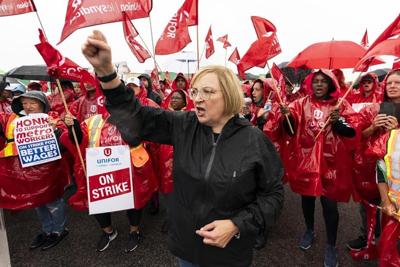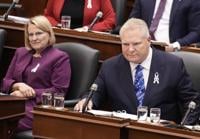TORONTO - The union representing striking grocery store workers at 27 Metro stores in the Greater Toronto Area has reached a tentative agreement with the retailer that could serve as a precedent for the union's coming contract talks with the other big grocers.
If ratified, the deal will bring an end to a month-long strike that saw grocery stores shuttered and later, distribution warehouses blocked from making deliveries as the dispute ramped up.
Unifor national president Lana Payne said in statement Wednesday that the union was able to negotiate the tentative deal thanks to the "unwavering commitment" of the workers.
"I commend the workers and the bargaining committee for their solidarity and also the customers who supported them during this difficult time."
The contract talks with Metro were the first for Unifor in a two-year stretch of negotiations for more than a dozen collective agreements with the major grocers. The union has said it hopes the Metro deal will help set a precedent for those upcoming talks.
In a statement Wednesday, Metro called the agreement fair and equitable, adding that the deal was unanimously recommended by the union's bargaining committee and will put an end to the labour dispute if ratified.
Details of the tentative deal were not immediately available, but the company said the agreement will be submitted to the employees for a ratification vote, which will take place early Thursday afternoon.
"This tentative agreement acknowledges the economic struggle that many of our members face,” Gord Currie, Unifor Local 414 president, said in a statement.
The employees went on strike on July 29 after rejecting an earlier tentative agreement that the union described as their best in decades.
During the weeks-long dispute, Metro workers began secondary picket lines at two distribution centres, preventing stores from receiving fresh products, a move for which the grocer was granted a temporary injunction.
Metro and Unifor went back to the bargaining table on Tuesday, the same day the injunction was granted.
Metro also filed an unfair labour complaint against Unifor last week, saying the union needed to return to the table to negotiate. At the time, Unifor said it was waiting for a better offer on wages for the Metro workers.
Since their last contract, the workers have endured a global pandemic, skyrocketing inflation and rising interest rates.
The Metro employees have been asking for higher wages as well as better working conditions and more full-time jobs. Some workers have said they struggle to afford groceries at their own stores.
The union had said workers want a bigger share of Metro’s profits, which have risen in the past couple of years, with some workers saying they want their pandemic "hero pay" — an extra $2 an hour — reinstated.
The "hero pay" issue has been central to the Metro workers' strike, Brock University labour professor Larry Savage previously told The ��ɫtv Press.
“Yes, it’s about money. But, more importantly, for these workers, it’s about respect. Because having that pandemic pay yanked away sent a very clear message to those workers that their labour wasn’t being respected," he said.
A recent study from the Competition Bureau found that the country’s three largest grocers, Metro included, collectively reported more than $100 billion in sales and $3.6 billion in profits last year.
This report by ��ɫtvwas first published Aug. 30, 2023.
Companies in this story: (TSX:MRU)








































